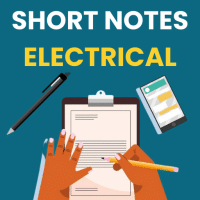Electrical Engineering (EE) Exam > Electrical Engineering (EE) Questions > In current source inverters load voltage wave...
Start Learning for Free
In current source inverters load voltage waveform V0 and load current waveform i0 respectively
- a)depends on load impedance Z, does not depends on Z.
- b)depends on Z, depends on Z.
- c)does not depend on Z, does not depend on Z.
- d)does not depend on Z, depends on Z.
Correct answer is option 'A'. Can you explain this answer?
Verified Answer
In current source inverters load voltage waveform V0 and load current ...
In a CSI, load current rather than load voltage is controlled, and the inverter output voltage is dependent upon the load impedance and the output voltage waveform. The load current and hence its waveform is independent of load impedance due to which a CSI has inherent protection against short-circuit across its terminals.
Most Upvoted Answer
In current source inverters load voltage waveform V0 and load current ...
Load impedance and its effect on load voltage and current waveforms in current source inverters:
Introduction:
A current source inverter (CSI) is a power electronic device that converts a DC input current into an AC output current. It is widely used in various applications such as motor drives, renewable energy systems, and power quality control. In a CSI, the load impedance plays a crucial role in determining the load voltage and load current waveforms.
Load Impedance and its significance:
The load impedance (Z) represents the combined effect of load resistance (R) and load reactance (X). It determines how the load responds to the current supplied by the CSI. The load impedance can be purely resistive (R), purely inductive (jX), or a combination of both.
Dependence of load voltage waveform on load impedance:
The load voltage waveform (V0) in a current source inverter depends on the load impedance (Z). The following factors explain this dependence:
1. Phase relationship: The phase relationship between the load voltage and the load current is determined by the load impedance. For a purely resistive load (Z = R), the load voltage waveform is in phase with the load current waveform. However, for a purely inductive load (Z = jX), the load voltage waveform lags behind the load current waveform by 90 degrees.
2. Magnitude: The magnitude of the load voltage waveform depends on the magnitude of the load impedance. A higher load impedance will result in a higher load voltage, while a lower load impedance will result in a lower load voltage.
Dependence of load current waveform on load impedance:
The load current waveform (i0) in a current source inverter also depends on the load impedance (Z). The following factors explain this dependence:
1. Magnitude: The magnitude of the load current waveform is directly influenced by the magnitude of the load impedance. A higher load impedance will result in a higher load current, while a lower load impedance will result in a lower load current.
2. Phase relationship: Similar to the load voltage waveform, the phase relationship between the load current and the load voltage is determined by the load impedance. For a purely resistive load (Z = R), the load current waveform is in phase with the load voltage waveform. However, for a purely inductive load (Z = jX), the load current waveform leads the load voltage waveform by 90 degrees.
Conclusion:
In conclusion, the load voltage waveform (V0) and load current waveform (i0) in current source inverters depend on the load impedance (Z). The load impedance determines the phase relationship and magnitude of these waveforms. A purely resistive load results in in-phase waveforms, while a purely inductive load results in waveforms with a 90-degree phase difference. Therefore, the correct answer is option 'A' - the load voltage and load current waveforms in current source inverters depend on the load impedance.
Introduction:
A current source inverter (CSI) is a power electronic device that converts a DC input current into an AC output current. It is widely used in various applications such as motor drives, renewable energy systems, and power quality control. In a CSI, the load impedance plays a crucial role in determining the load voltage and load current waveforms.
Load Impedance and its significance:
The load impedance (Z) represents the combined effect of load resistance (R) and load reactance (X). It determines how the load responds to the current supplied by the CSI. The load impedance can be purely resistive (R), purely inductive (jX), or a combination of both.
Dependence of load voltage waveform on load impedance:
The load voltage waveform (V0) in a current source inverter depends on the load impedance (Z). The following factors explain this dependence:
1. Phase relationship: The phase relationship between the load voltage and the load current is determined by the load impedance. For a purely resistive load (Z = R), the load voltage waveform is in phase with the load current waveform. However, for a purely inductive load (Z = jX), the load voltage waveform lags behind the load current waveform by 90 degrees.
2. Magnitude: The magnitude of the load voltage waveform depends on the magnitude of the load impedance. A higher load impedance will result in a higher load voltage, while a lower load impedance will result in a lower load voltage.
Dependence of load current waveform on load impedance:
The load current waveform (i0) in a current source inverter also depends on the load impedance (Z). The following factors explain this dependence:
1. Magnitude: The magnitude of the load current waveform is directly influenced by the magnitude of the load impedance. A higher load impedance will result in a higher load current, while a lower load impedance will result in a lower load current.
2. Phase relationship: Similar to the load voltage waveform, the phase relationship between the load current and the load voltage is determined by the load impedance. For a purely resistive load (Z = R), the load current waveform is in phase with the load voltage waveform. However, for a purely inductive load (Z = jX), the load current waveform leads the load voltage waveform by 90 degrees.
Conclusion:
In conclusion, the load voltage waveform (V0) and load current waveform (i0) in current source inverters depend on the load impedance (Z). The load impedance determines the phase relationship and magnitude of these waveforms. A purely resistive load results in in-phase waveforms, while a purely inductive load results in waveforms with a 90-degree phase difference. Therefore, the correct answer is option 'A' - the load voltage and load current waveforms in current source inverters depend on the load impedance.
Free Test
FREE
| Start Free Test |
Community Answer
In current source inverters load voltage waveform V0 and load current ...
A

|
Explore Courses for Electrical Engineering (EE) exam
|

|
Question Description
In current source inverters load voltage waveform V0 and load current waveform i0 respectivelya)depends on load impedance Z, does notdepends on Z.b)depends on Z, depends on Z.c)does not depend on Z, does not depend on Z.d)does not depend on Z, depends on Z.Correct answer is option 'A'. Can you explain this answer? for Electrical Engineering (EE) 2025 is part of Electrical Engineering (EE) preparation. The Question and answers have been prepared according to the Electrical Engineering (EE) exam syllabus. Information about In current source inverters load voltage waveform V0 and load current waveform i0 respectivelya)depends on load impedance Z, does notdepends on Z.b)depends on Z, depends on Z.c)does not depend on Z, does not depend on Z.d)does not depend on Z, depends on Z.Correct answer is option 'A'. Can you explain this answer? covers all topics & solutions for Electrical Engineering (EE) 2025 Exam. Find important definitions, questions, meanings, examples, exercises and tests below for In current source inverters load voltage waveform V0 and load current waveform i0 respectivelya)depends on load impedance Z, does notdepends on Z.b)depends on Z, depends on Z.c)does not depend on Z, does not depend on Z.d)does not depend on Z, depends on Z.Correct answer is option 'A'. Can you explain this answer?.
In current source inverters load voltage waveform V0 and load current waveform i0 respectivelya)depends on load impedance Z, does notdepends on Z.b)depends on Z, depends on Z.c)does not depend on Z, does not depend on Z.d)does not depend on Z, depends on Z.Correct answer is option 'A'. Can you explain this answer? for Electrical Engineering (EE) 2025 is part of Electrical Engineering (EE) preparation. The Question and answers have been prepared according to the Electrical Engineering (EE) exam syllabus. Information about In current source inverters load voltage waveform V0 and load current waveform i0 respectivelya)depends on load impedance Z, does notdepends on Z.b)depends on Z, depends on Z.c)does not depend on Z, does not depend on Z.d)does not depend on Z, depends on Z.Correct answer is option 'A'. Can you explain this answer? covers all topics & solutions for Electrical Engineering (EE) 2025 Exam. Find important definitions, questions, meanings, examples, exercises and tests below for In current source inverters load voltage waveform V0 and load current waveform i0 respectivelya)depends on load impedance Z, does notdepends on Z.b)depends on Z, depends on Z.c)does not depend on Z, does not depend on Z.d)does not depend on Z, depends on Z.Correct answer is option 'A'. Can you explain this answer?.
Solutions for In current source inverters load voltage waveform V0 and load current waveform i0 respectivelya)depends on load impedance Z, does notdepends on Z.b)depends on Z, depends on Z.c)does not depend on Z, does not depend on Z.d)does not depend on Z, depends on Z.Correct answer is option 'A'. Can you explain this answer? in English & in Hindi are available as part of our courses for Electrical Engineering (EE).
Download more important topics, notes, lectures and mock test series for Electrical Engineering (EE) Exam by signing up for free.
Here you can find the meaning of In current source inverters load voltage waveform V0 and load current waveform i0 respectivelya)depends on load impedance Z, does notdepends on Z.b)depends on Z, depends on Z.c)does not depend on Z, does not depend on Z.d)does not depend on Z, depends on Z.Correct answer is option 'A'. Can you explain this answer? defined & explained in the simplest way possible. Besides giving the explanation of
In current source inverters load voltage waveform V0 and load current waveform i0 respectivelya)depends on load impedance Z, does notdepends on Z.b)depends on Z, depends on Z.c)does not depend on Z, does not depend on Z.d)does not depend on Z, depends on Z.Correct answer is option 'A'. Can you explain this answer?, a detailed solution for In current source inverters load voltage waveform V0 and load current waveform i0 respectivelya)depends on load impedance Z, does notdepends on Z.b)depends on Z, depends on Z.c)does not depend on Z, does not depend on Z.d)does not depend on Z, depends on Z.Correct answer is option 'A'. Can you explain this answer? has been provided alongside types of In current source inverters load voltage waveform V0 and load current waveform i0 respectivelya)depends on load impedance Z, does notdepends on Z.b)depends on Z, depends on Z.c)does not depend on Z, does not depend on Z.d)does not depend on Z, depends on Z.Correct answer is option 'A'. Can you explain this answer? theory, EduRev gives you an
ample number of questions to practice In current source inverters load voltage waveform V0 and load current waveform i0 respectivelya)depends on load impedance Z, does notdepends on Z.b)depends on Z, depends on Z.c)does not depend on Z, does not depend on Z.d)does not depend on Z, depends on Z.Correct answer is option 'A'. Can you explain this answer? tests, examples and also practice Electrical Engineering (EE) tests.

|
Explore Courses for Electrical Engineering (EE) exam
|

|
Signup for Free!
Signup to see your scores go up within 7 days! Learn & Practice with 1000+ FREE Notes, Videos & Tests.


















